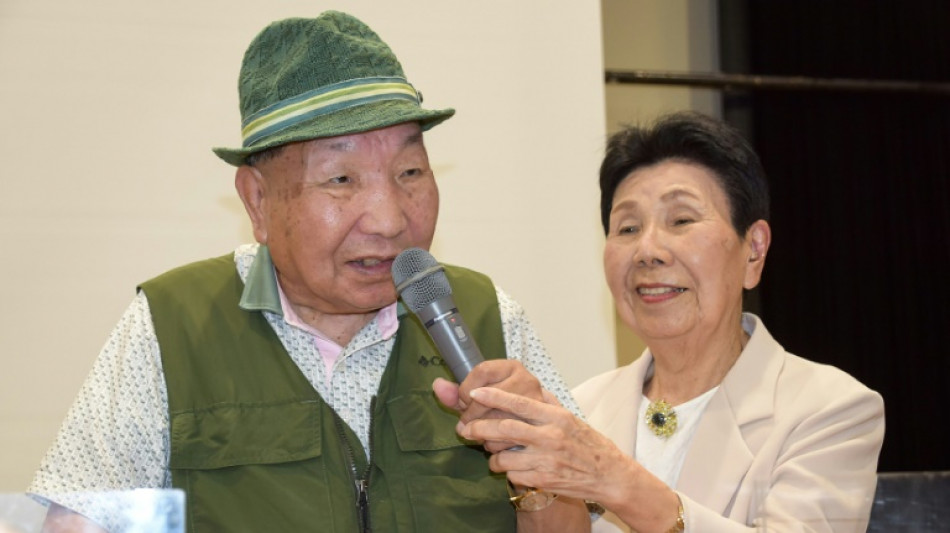
-
 Australia's Mary Fowler set for long lay-off after ACL injury
Australia's Mary Fowler set for long lay-off after ACL injury
-
Rubio to meet French leaders for talks on Ukraine
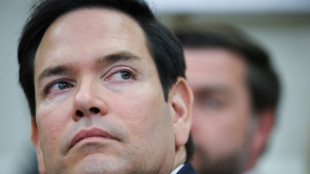
-
 Webb spots strongest 'hints' yet of life on distant planet
Webb spots strongest 'hints' yet of life on distant planet
-
Arteta's Arsenal come of age with Madrid masterclass

-
 None spared in Nigeria gun, machete massacre: survivors
None spared in Nigeria gun, machete massacre: survivors
-
'No problem' if Real Madrid replace me: Ancelotti

-
 Inter dreaming of treble glory after reaching Champions League semis
Inter dreaming of treble glory after reaching Champions League semis
-
'No limits' for treble-hunting Inter, says Pavard

-
 Inter off Bayern to reach Champions League last four
Inter off Bayern to reach Champions League last four
-
Rice 'knew' Arsenal would dethrone Real Madrid

-
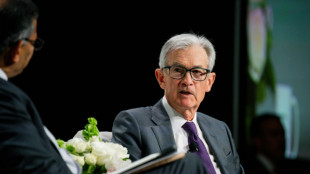 US stocks fall with dollar as Powell warns on tariffs
US stocks fall with dollar as Powell warns on tariffs
-
Arsenal oust holders Real Madrid to reach Champions League semis

-
 Arsenal defeat Real Madrid to reach Champions League semis
Arsenal defeat Real Madrid to reach Champions League semis
-
AMD says US rule on chips to China could cost it $800 mn

-
 Inter hold off Bayern to reach Champions League last four
Inter hold off Bayern to reach Champions League last four
-
El Salvador rejects US senator's plea to free wrongly deported migrant
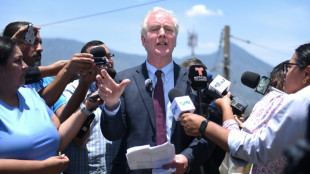
-
 Newcastle thrash Crystal Palace to go third in Premier League
Newcastle thrash Crystal Palace to go third in Premier League
-
Zuckerberg denies Meta bought rivals to conquer them

-
 Starc stars as Delhi beat Rajasthan in Super Over
Starc stars as Delhi beat Rajasthan in Super Over
-
Weinstein asks to sleep in hospital, citing prison 'mistreatment'
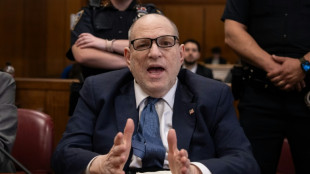
-
 Amorim asks McIlroy to bring Masters magic to Man Utd
Amorim asks McIlroy to bring Masters magic to Man Utd
-
Ruud keeps Barcelona Open defence on course

-
 Trump tariffs could put US Fed in a bind, Powell warns
Trump tariffs could put US Fed in a bind, Powell warns
-
CONCACAF chief rejects 64-team World Cup plan for 2030

-
 Putin praises Musk, compares him to Soviet space hero
Putin praises Musk, compares him to Soviet space hero
-
Son to miss Spurs' Europa League trip to Frankfurt

-
 US senator in El Salvador seeking release of wrongly deported migrant
US senator in El Salvador seeking release of wrongly deported migrant
-
Trump tariffs could put the US Fed in a bind, Powell warns

-
 US judge says 'probable cause' to hold Trump admin in contempt
US judge says 'probable cause' to hold Trump admin in contempt
-
India opposition slams graft charges against Gandhis

-
 Nate Bargatze to host Emmys: organizers
Nate Bargatze to host Emmys: organizers
-
US Fed Chair warns of 'tension' between employment, inflation goals

-
 Trump touts trade talks, China calls out tariff 'blackmail'
Trump touts trade talks, China calls out tariff 'blackmail'
-
US judge says 'probable cause' to hold govt in contempt over deportations

-
 US eliminates unit countering foreign disinformation
US eliminates unit countering foreign disinformation
-
Germany sees 'worrying' record dry spell in early 2025

-
 Israel says 30 percent of Gaza turned into buffer zone
Israel says 30 percent of Gaza turned into buffer zone
-
TikTok tests letting users add informative 'Footnotes'

-
 Global uncertainty will 'certainly' hit growth: World Bank president
Global uncertainty will 'certainly' hit growth: World Bank president
-
EU lists seven 'safe' countries of origin, tightening asylum rules

-
 Chelsea fans must 'trust' the process despite blip, says Maresca
Chelsea fans must 'trust' the process despite blip, says Maresca
-
Rebel rival government in Sudan 'not the answer': UK

-
 Prague zoo breeds near-extinct Brazilian mergansers
Prague zoo breeds near-extinct Brazilian mergansers
-
Macron to meet Rubio, Witkoff amid transatlantic tensions

-
 WTO chief says 'very concerned' as tariffs cut into global trade
WTO chief says 'very concerned' as tariffs cut into global trade
-
Sports bodies have 'no excuses' on trans rules after court ruling: campaigners

-
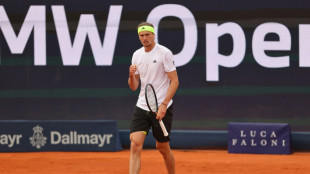 Zverev joins Shelton in Munich ATP quarters
Zverev joins Shelton in Munich ATP quarters
-
The Trump adviser who wants to rewrite the global financial system
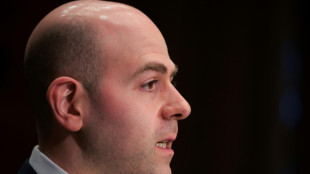
-
 US senator travels to El Salvador over wrongly deported migrant
US senator travels to El Salvador over wrongly deported migrant
-
UN watchdog chief says Iran 'not far' from nuclear bomb


Ex-judge fights Japan's 'unopenable door' retrial system
The world's longest-serving death row prisoner, Iwao Hakamada, won compensation from Japan this week after almost five decades in jail -- and he owes his freedom to a judge with steely determination.
The former boxer, now 89, was exonerated last year of a 1966 quadruple murder after a tireless campaign by his sister and others.
But he might still be behind bars if not for Hiroaki Murayama, the judge who in 2014 dared do something extremely rare in Japan's often intractable legal system: he ordered a retrial.
Prosecutors appealed the order andit took nine years for the retrial to open, something which Murayama partly blames himself for after not writing a "more airtight ruling".
But mostly it's because the system is haphazard, outdated and out of step with international standards, the 68-year-old now retired judge said.
"Retrial is supposed to be the last possible measure to save the wrongfully incarcerated, but the system is not functioning as it should," Murayama told AFP in an interview last month.
Lawyers first called for a retrial in 1981: it would take 42 years for that process to actually start.
This week the court that acquitted Hakamada in the retrial -- where it said police had tampered with evidence and carried out "inhumane interrogations" meant to force a confession -- awarded him $1.4 million for his wrongful detention between 1966 and 2014.
However, after decades in solitary confinement, he is now "living in a world of fantasy," his supporters say.
Softly-spoken Murayama, who ordered the retrial but was not involved in the acquittal or compensation order, was stung by the experience and wants change.
"I was once part of that system. And now that I learned what it's really like, it's my responsibility to fix it," he said.
"There can be no more Hakamadas".
- 'Disparities' -
The former judge's experience with one of the worst miscarriages of justice in post-war Japan has made him reflect on the death penalty itself.
Japan's retrial process was shaped a century ago and has since been left nearly untouched.
Critics label it the "Unopenable Door".
Just one percent of around 1,150 retrial applications from all convicts, processed in Japan between 2017 and 2021, won approval.
The justice minister is set this week to ask legal experts to scrutinise the system for possible revisions, but the process could take years.
Factors behind its slowness include the prosecution's power to appeal retrial orders, and some judges failing to push for new, exculpatory evidence.
This, Murayama says, creates "disparities" among applications, with progress dependent on the "work ethics" of each judge.
"Many judges prioritise efficiently solving ongoing criminal cases, because that's often a barometer of their competence", Murayama said.
"Does working hard on retrial applications help judges earn a good reputation? I'm not sure."
- 'Dependent on chance' -
Murayama said he had made it his "team's biggest priority to speed up deliberations" on Hakamada's case.
Decades of detention -- with the threat of execution constantly looming -- took a major toll on Hakamada's mental health.
Murayama said he had been "worried sick" that Hakamada might die while the legal process dragged out.
So he dived into reams of records and chivvied prosecutors.
"It's extremely unlikely that prosecutors give away evidence voluntarily", he said. "You really have to push them."
In the hands of another judge with less initiative, Hakamada's fortune might have turned out differently.
A system "so dependent on chance or luck, isn't a system at all," Murayama said.
Japan and the United States are the only major industrialised democracies with capital punishment, which has broad support from the Japanese public.
Murayama in 2011 sentenced Tomohiro Kato to death for the murder of seven people in a rampage in Tokyo in 2008.
He was hanged in 2022.
"I'm not the one who actually killed him, but I ordered his death nonetheless", Murayama said, adding that he "couldn't sleep for three days" after his hanging.
Murayama said it was a "gut-wrenching decision", but concedes that hanging would remain his only realistic option for Kato were he still a judge -- unless he can argue capital punishment itself is unconstitutional.
"The death penalty involves the state power murdering a defenceless human being. Should we really accept that as a society?", the judge-turned-lawyer said.
Hakamada was post-war Japan's fifth wrongfully convicted death-row inmate who avoided death through a retrial.
"Had they been executed, that would've been an irrevocable catastrophe," Murayama said.
"And don't you dare say it's been just four or five people. Not even one person should suffer this."
P.Staeheli--VB

